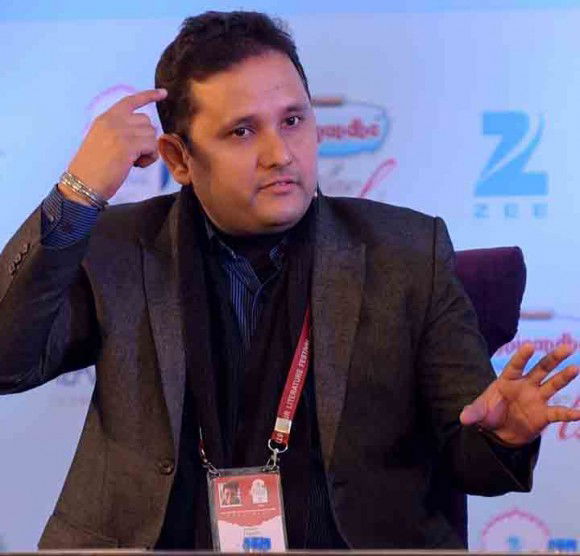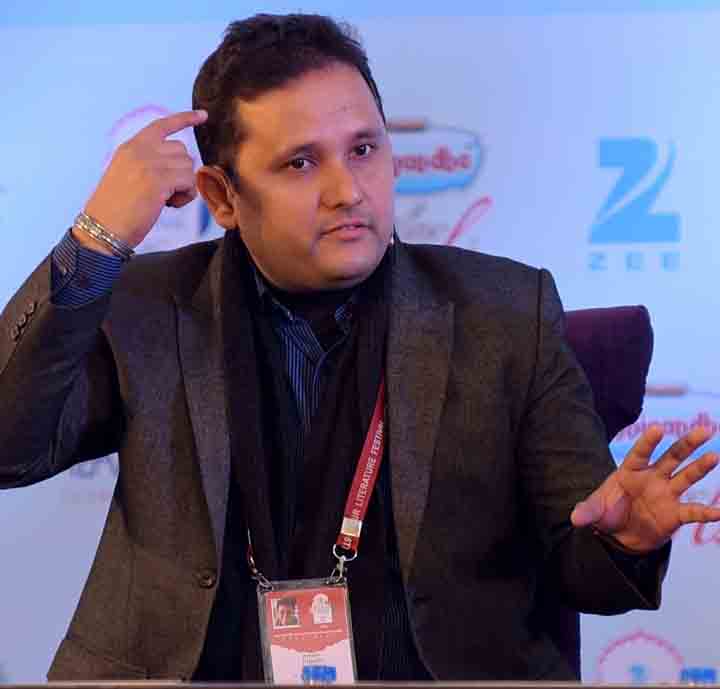Articles features
Caste system in ancient India wasn't rigid: Author Amish Tripathi

Kolkata, Jan 24
As India battles the widespread anger following a Dalit research scholar's suicide, best-selling author Amish Tripathi is trying to drive home the message that in ancient India the caste system was not rigid and was not attributed to one's birth.
Tripathi, who deftly weaves in threads on women's empowerment and the caste system in his interpretations of Indian mythologies, prefers to reserve his judgement on the Hyderabad University issue since it's under investigation.
But he concedes that oppression continues despite the progress the country has made in the last almost 70 years since independence.
Rohith Vemula's death on January 17 in Hyderabad University after being suspended for allegedly assaulting an ABVP leader has resulted in mass protests across India.
"As far as specific incidents are concerned, learning from the Delhi church attacks and Ranaghat nun rape case (In West Bengal), it turned out the incidents were not how they were portrayed; so we should stay calm and wait for investigation to conclude.
"At a broader level, there is no doubt oppression does take place. We have made improvements in the last 70 years but there is still a long way to go," Tripathi, who burst on to the scene in 2010 with the popular Shiva trilogy, told IANS in an interview here during the Tata Steel Kolkata Literary Meet.
The banker-turned-writer penned the hugely successful "The Immortals of Meluha", "The Secret of the Nagas" and "The Oath of the Vayuputras" novels of the Shiva trilogy. His latest "Scion of Ikshvaku" is the first book in the Ram Chandra series - his take on the Indian epic Ramayana. The second book is in progress and talks are on for movie adaptations.
"In my books, I actually speak about the caste system. If you see the genetic research that is coming out, it's very clear the caste system was not based on birth. In ancient times it was not rigid," the 41 year-old IIM-Calcutta alumnus contended.
As examples, he says Maharishi Valmiki who wrote the Valmiki Ramayana was not born a Brahmin.
"The Maharishi who composed the Mahabharata, who compiled the Vedas, was not born a Brahmin, he was born to a fisherwoman. He became a Brahmin... not just a Brahmin... he became a rishi (sage)," Tripathi underlined.
In addition to the textual proof, he also lays strong emphasis on current genetic research.
"Research shows till around 1,900 to 2,000 years ago, there was heavy intermingling in India between all groups. That's the first sign of caste system... there is no inter-marrying. Something happened between 1,500 to 2,000 years ago when the inter-marrying stopped. So some people assume that is when the caste system became rigid.
"In ancient times, most of the evidence points to the fact that the caste system was actually not rigid and that is what I am trying to bring out in my books. It was not based on birth. In the Bhagavad Gita, Lord Krishna clearly says: I created the four varnas based on 'guna' and 'karma' based on your attributes and on your karma, not on birth."
Ascribing his knowledge of mythology and scriptures to his family (his paternal grandfather was a pandit and taught at Banaras Hindu University, his maternal grandmother was also a teacher), Tripathi says his love for India doesn't mean he can turn a blind eye to issues that need to be dealt with.
"I am a deep patriot. I love my country but I also believe patriotism should not blind us to the things that need to be improved and of course one doesn't like to be told about our country by Westerners, most of them likely have no love for our country; they just want to come and judge us.
"There's a difference in the attitude of someone who deeply loves his or her own country and there are things which he feels needs to improve," Tripathi signed off.
(Sahana Ghosh can be contacted at [email protected])
Tripathi, who deftly weaves in threads on women's empowerment and the caste system in his interpretations of Indian mythologies, prefers to reserve his judgement on the Hyderabad University issue since it's under investigation.
But he concedes that oppression continues despite the progress the country has made in the last almost 70 years since independence.
Rohith Vemula's death on January 17 in Hyderabad University after being suspended for allegedly assaulting an ABVP leader has resulted in mass protests across India.
"As far as specific incidents are concerned, learning from the Delhi church attacks and Ranaghat nun rape case (In West Bengal), it turned out the incidents were not how they were portrayed; so we should stay calm and wait for investigation to conclude.
"At a broader level, there is no doubt oppression does take place. We have made improvements in the last 70 years but there is still a long way to go," Tripathi, who burst on to the scene in 2010 with the popular Shiva trilogy, told IANS in an interview here during the Tata Steel Kolkata Literary Meet.
The banker-turned-writer penned the hugely successful "The Immortals of Meluha", "The Secret of the Nagas" and "The Oath of the Vayuputras" novels of the Shiva trilogy. His latest "Scion of Ikshvaku" is the first book in the Ram Chandra series - his take on the Indian epic Ramayana. The second book is in progress and talks are on for movie adaptations.
"In my books, I actually speak about the caste system. If you see the genetic research that is coming out, it's very clear the caste system was not based on birth. In ancient times it was not rigid," the 41 year-old IIM-Calcutta alumnus contended.
As examples, he says Maharishi Valmiki who wrote the Valmiki Ramayana was not born a Brahmin.
"The Maharishi who composed the Mahabharata, who compiled the Vedas, was not born a Brahmin, he was born to a fisherwoman. He became a Brahmin... not just a Brahmin... he became a rishi (sage)," Tripathi underlined.
In addition to the textual proof, he also lays strong emphasis on current genetic research.
"Research shows till around 1,900 to 2,000 years ago, there was heavy intermingling in India between all groups. That's the first sign of caste system... there is no inter-marrying. Something happened between 1,500 to 2,000 years ago when the inter-marrying stopped. So some people assume that is when the caste system became rigid.
"In ancient times, most of the evidence points to the fact that the caste system was actually not rigid and that is what I am trying to bring out in my books. It was not based on birth. In the Bhagavad Gita, Lord Krishna clearly says: I created the four varnas based on 'guna' and 'karma' based on your attributes and on your karma, not on birth."
Ascribing his knowledge of mythology and scriptures to his family (his paternal grandfather was a pandit and taught at Banaras Hindu University, his maternal grandmother was also a teacher), Tripathi says his love for India doesn't mean he can turn a blind eye to issues that need to be dealt with.
"I am a deep patriot. I love my country but I also believe patriotism should not blind us to the things that need to be improved and of course one doesn't like to be told about our country by Westerners, most of them likely have no love for our country; they just want to come and judge us.
"There's a difference in the attitude of someone who deeply loves his or her own country and there are things which he feels needs to improve," Tripathi signed off.
(Sahana Ghosh can be contacted at [email protected])


1 hour ago
Prayers from ancient Hindu scriptures to open Corpus Christi City Council in Texas

1 hour ago
Diljit Dosanjh flashes a smile and waves at paparazzi in his first public appearance after ‘Sardaar Ji 3’ row

1 hour ago
Madhoo says ‘stress management equals time management’

1 hour ago
Smriti Irani offers prayers on first Sawan Somvar ahead of Kyunki Saas Bhi Kabhi Bahu Thi’ comeback

1 hour ago
First look of ‘The Revolutionaries’ builds anticipation for India’s fierce fight against British imperial power

1 hour ago
Isha Koppikar: Didn’t know it was okay to say ‘I’m not okay’

1 hour ago
Niyatii Fatnani shares how her role in 'Rose Garden' deepened her growth as an actress

1 hour ago
Stunt artist passes away doing a car toppling sequence in Pa. Ranjith’s film

1 hour ago
Ashi Singh shares her ‘Ufff… Yeh Love Hai Mushkil’ character Kairi is ‘very much like’ her

1 hour ago
Four men from Rajasthan die as SUV falls into ditch in MP's Sheopur

1 hour ago
MP: Harda tensions ease as curbs lifted, Karni Sena to stick to peaceful protest

1 hour ago
Toddy adulteration in Hyderabad: Death toll rises to nine

1 hour ago
Dhoni’s favourite Hummer gets military makeover, goes viral on social media
































